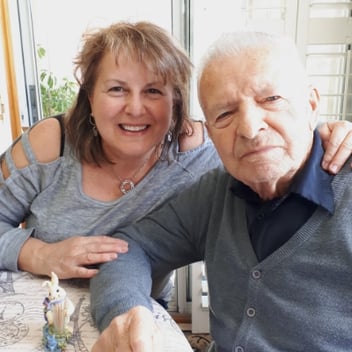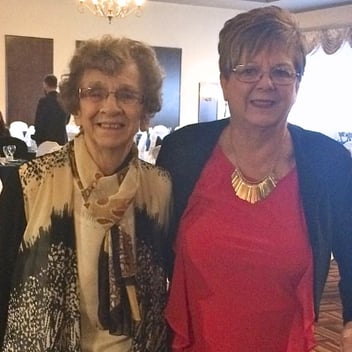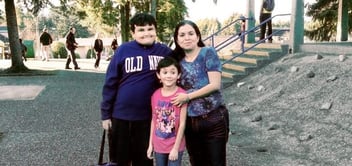How MedicAlert’s Safe & Found Program became respite for the spouse of an Alzheimer’s patient
It started innocently enough, around the time Johanna was diagnosed with ovarian cancer in 2017. Frank, Johanna’s loving partner, was supportive and kind and, of course, worried. That was typical of their union which began 17 years earlier at their local tennis club in Montreal.



But what wasn’t typical was Frank’s increasing inability to keep dates and appointment schedules straight. The retired executive who had worked for many years in the complex area of high-risk insurance was notoriously organized and detail oriented. This wasn’t him.
Trips to Frank’s physician didn’t reveal much either. Johanna, a retired psychotherapist, says his doctor was kind, but brushed it off as typical of getting older. “He’d just say, ‘We all forget things as we age.’”
For Johanna it was the day Frank tried to turn off their home security alarm by using his bank card pin number that she knew something was inherently wrong. “He was insistent that he hadn’t made any kind of mistake. But I knew something wasn’t right. I told him we were going to make a list of five things that, to me, indicated that his memory was faltering, and that he must go back to his doctor to share the information.”
At that point, Frank’s doctor could no longer ignore the issues and referred him to the Anne and Louis Goldfarb Jewish General Hospital/McGill University Memory Clinic where in late 2019 he was diagnosed with mild cognitive impairment.
Within two years, Frank’s condition progressed to the point where he was formally diagnosed with Alzheimer’s.
Johanna felt like she was thrown into the ocean and left to find her own way to shore. “It wasn’t like my cancer. In that case I knew what it was, there was a plan, and we executed the plan. It was a straight line from beginning to end. While it was difficult, there was a process. With Frank, it is the complete opposite. Not only is there no treatment plan for Alzheimer’s but, it is also a challenge to learn about the resources that are, or might be, available for the care of the person with Alzheimer’s and support for the care partner.”
In the winter of 2022 Johanna was first introduced to the idea of products for wandering by Frank’s social worker. But Johanna’s initial research focused on GPS and fall detection which didn’t feel as though it was the right thing for her husband’s situation -- not to mention the costs for these services were somewhat prohibitive. “Other than his Alzheimer’s Frank is a very healthy person. Even in his 80s, he still plays tennis with a dear friend. Fall detection and GPS monitoring was a bit over the top for what we needed.”
It was almost a year later in a “sharing room” for care partners of individuals living with dementia, that Johanna was again reminded of products for wandering. “Frank has never wandered, but there were people who had shared their stories about their loved ones who had. I thought it was something I needed to re-investigate. Johanna then reached out to someone at her local Alzheimer’s Society – MedicAlert’s long-time partner -- and learned about MedicAlert and the Safe & Found Program. Immediately she knew this was the right fit for Frank.
“Once I had found MedicAlert, the price was right, the process was easy, and more important the detailed health record that includes very specific things about Frank’s Alzheimer’s and who to contact if he wanders is reassuring,” she says. “At first Frank took off the blue ID we got in January this year – the specific one for people living with Alzheimer’s. I told him the ID was something he needs to always wear, even in the shower. So now he wears it all the time.”
Having MedicAlert as part of her tool kit to support Frank is a tremendous relief to Johanna. She knows that at this stage of his disease progression, he understands what the ID is for and how he can help someone to use it if he is ever lost. “Though Frank goes out very infrequently on his own, I can feel comfortable if he does go for a walk around our neighbourhood. That blue bracelet, and the fact that it links to a personal health record, takes a big weight off my shoulders.”
So, too, is the weekly Skype call Frank shares with his brother, Bernard, every Thursday morning from 10:00 am to 11:30 am. “They share old memories of their younger days in the UK or Casablanca, which is where Frank lived before he emigrated to Montreal in about 1965.”
There’s a melancholy in Johanna’s eyes when she talks about Frank’s illness and all that’s been lost in such a short amount of time. “Frank is still here, and his gentle nature is still very much who he is,” says Johanna. “But It has been painful to witness the melting away of his memories of our 22 years together.”
While it’s difficult, Johanna is grateful to have the support of friends, family, the health professionals at Jewish General Hospital, and particularly the support network at the Alzheimer’s Society. She’s also reassured by the newest member of Frank’s circle of care – the team at MedicAlert.



